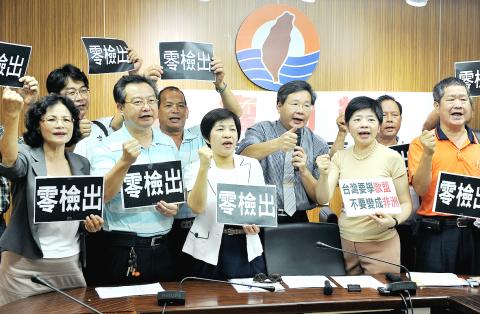Pig farmers and the Taiwan Solidarity Union (TSU) yesterday called for zero tolerance on the animal feed additive ractopamine, with an imminent relaxation of regulations governing imports of meat containing residues of the drug appearing inevitable as an extra legislative session begins today.
“While the Codex Alimentarius Commission narrowly voted in favor of maximum residue levels [MRL] of ractopamine on July 5, the TSU insists on zero tolerance of the drug,” TSU caucus whip Hsu Chung-hsin (許忠信) told a joint press conference with representatives of pig farmers.
The TSU would block the legislative proceeding in the extra session, Hsu said, but he declined to disclose how the party would do so.

Photo: Chien Jung-fong, Taipei Times
Hsu said his party opposed relaxing a ban on meat with ractopamine residues because it was doubtful the government would be able to implement its four principles regarding meat imports.
The four principles include establishing a safe level of ractopamine residues for beef imports, differentiating the safety standards for beef and pork products, requiring mandatory labeling of beef products and maintaining the ban on imports of beef offal from the US.
Hsu said a Chinese Nationalist Party (KMT) plan to differentiate pork and beef safety standards in an additional resolution would be ineffective because the additional resolution would not be legally binding.
“That is why pig farmers are worried,” Republic of China Swine Association president Yang Kuan-chang (楊冠章) said, adding that the commission’s decision had panicked local pig farmers.
“Pig farmers are extremely suspicious of the Council of Agriculture’s pledge that ractopamine-tainted US pork imports would not be allowed,” said Lin Chiu-kuei (林秋桂), first deputy chairperson of the association and president of the Chiayi County Swine Association.
TSU Legislator Lin Shih-chia (林世嘉) said Taiwan should follow the example of the EU, which maintains a zero-tolerance policy on ractopamine, adding that the nation should apply its own measures to safeguard food safety, citing the WTO’s Sanitary and Phytosanitary Measures.

Taiwanese can file complaints with the Tourism Administration to report travel agencies if their activities caused termination of a person’s citizenship, Mainland Affairs Council Minister Chiu Chui-cheng (邱垂正) said yesterday, after a podcaster highlighted a case in which a person’s citizenship was canceled for receiving a single-use Chinese passport to enter Russia. The council is aware of incidents in which people who signed up through Chinese travel agencies for tours of Russia were told they could obtain Russian visas and fast-track border clearance, Chiu told reporters on the sidelines of an event in Taipei. However, the travel agencies actually applied

Japanese footwear brand Onitsuka Tiger today issued a public apology and said it has suspended an employee amid allegations that the staff member discriminated against a Vietnamese customer at its Taipei 101 store. Posting on the social media platform Threads yesterday, a user said that an employee at the store said that “those shoes are very expensive” when her friend, who is a migrant worker from Vietnam, asked for assistance. The employee then ignored her until she asked again, to which she replied: "We don't have a size 37." The post had amassed nearly 26,000 likes and 916 comments as of this

New measures aimed at making Taiwan more attractive to foreign professionals came into effect this month, the National Development Council said yesterday. Among the changes, international students at Taiwanese universities would be able to work in Taiwan without a work permit in the two years after they graduate, explainer materials provided by the council said. In addition, foreign nationals who graduated from one of the world’s top 200 universities within the past five years can also apply for a two-year open work permit. Previously, those graduates would have needed to apply for a work permit using point-based criteria or have a Taiwanese company

The Shilin District Prosecutors’ Office yesterday indicted two Taiwanese and issued a wanted notice for Pete Liu (劉作虎), founder of Shenzhen-based smartphone manufacturer OnePlus Technology Co (萬普拉斯科技), for allegedly contravening the Act Governing Relations Between the People of the Taiwan Area and the Mainland Area (臺灣地區與大陸地區人民關係條例) by poaching 70 engineers in Taiwan. Liu allegedly traveled to Taiwan at the end of 2014 and met with a Taiwanese man surnamed Lin (林) to discuss establishing a mobile software research and development (R&D) team in Taiwan, prosecutors said. Without approval from the government, Lin, following Liu’s instructions, recruited more than 70 software